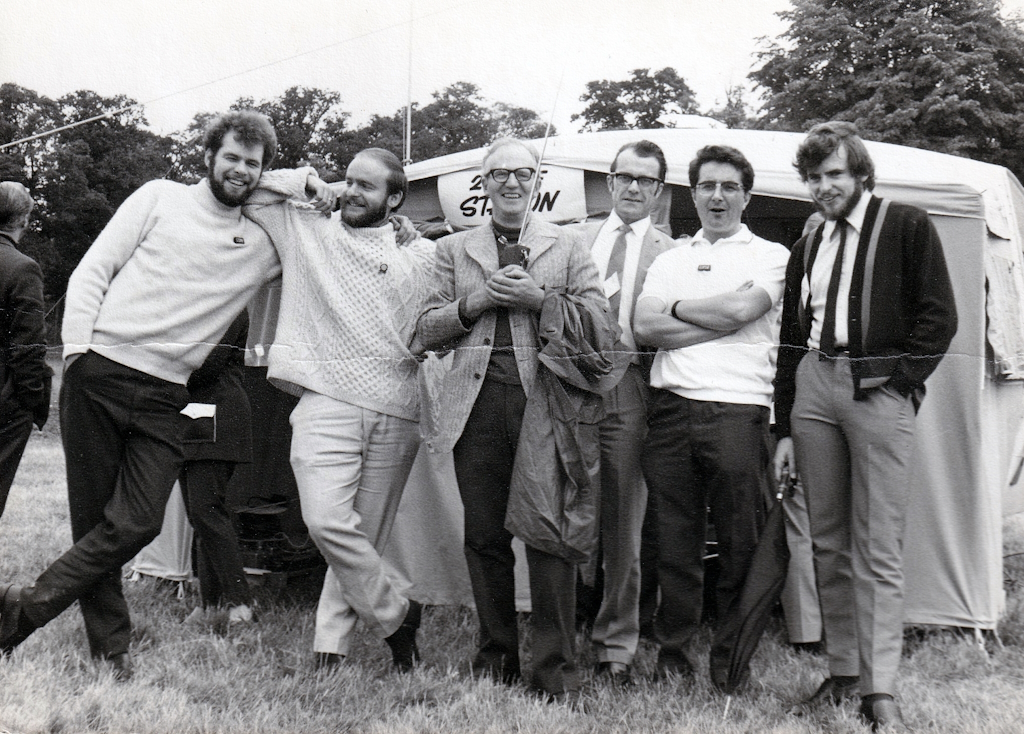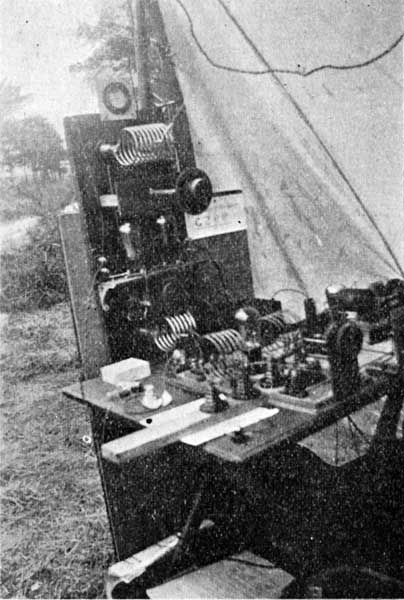Pre-War Entries 1933-37
RSGB National Field Day (NFD) was started in 1933 and before the war was run on a district basis. Entries were under the direction of the District Representative (DR). At first only two stations per district were required but 1937 this was increased to one per band – 4.
Bristol was involved in the District 5 entries from the very first contest when Mr. R.A. Bartlett, G6RB/P was the equal first “A” station with 123 points, the District coming third.
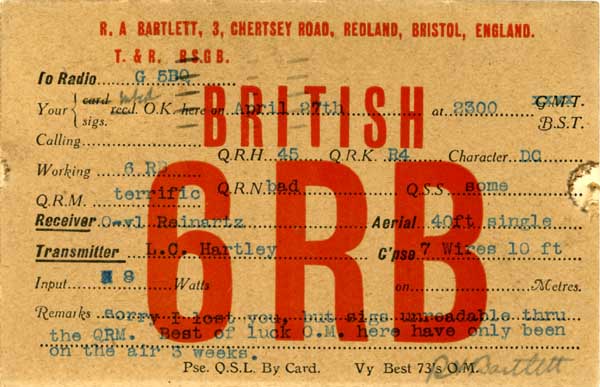
In 1934 the district won with a total of 361 points, G6RB again providing the “A” station and working 3 ZLs. At right is a picture of the equipment used at G2OP, the other district 5 station. In 1935 the district was 5th. and in 1936, 8th. G6RB/P operated from Dundry on all occasions. He was first in the 1938 7 Mc/s section.
The Post-War Years
It appears that after the war entries were made on a town basis. I have not yet found a copy of the post-war rules. If anyone has the relevant copy of the “Bull” I would be most interested to consult it. From the minutes it seems that only two stations were required, the “A” station transmitting on 1.7 and 3.5 Mc/s and the “B” station on 7 and 14 Mc/s. The maximum power was 5 watts DC input! There was some discussion of returning to the higher pre-war power levels in 1949 but Bristol were opposed. The status quo continued throughout this period.

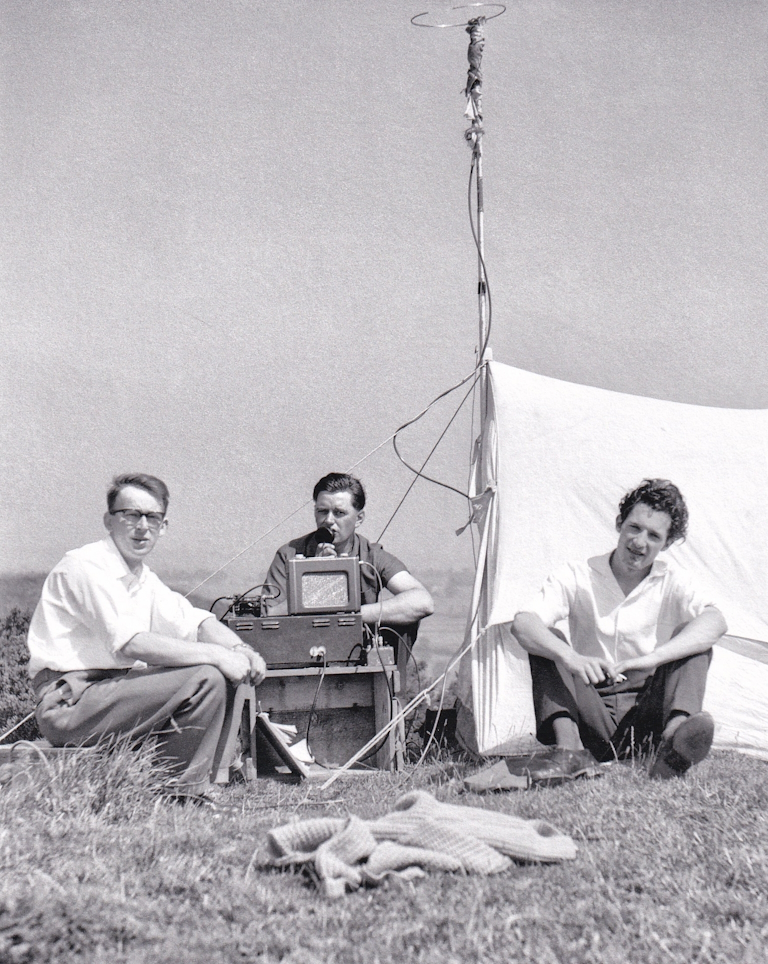
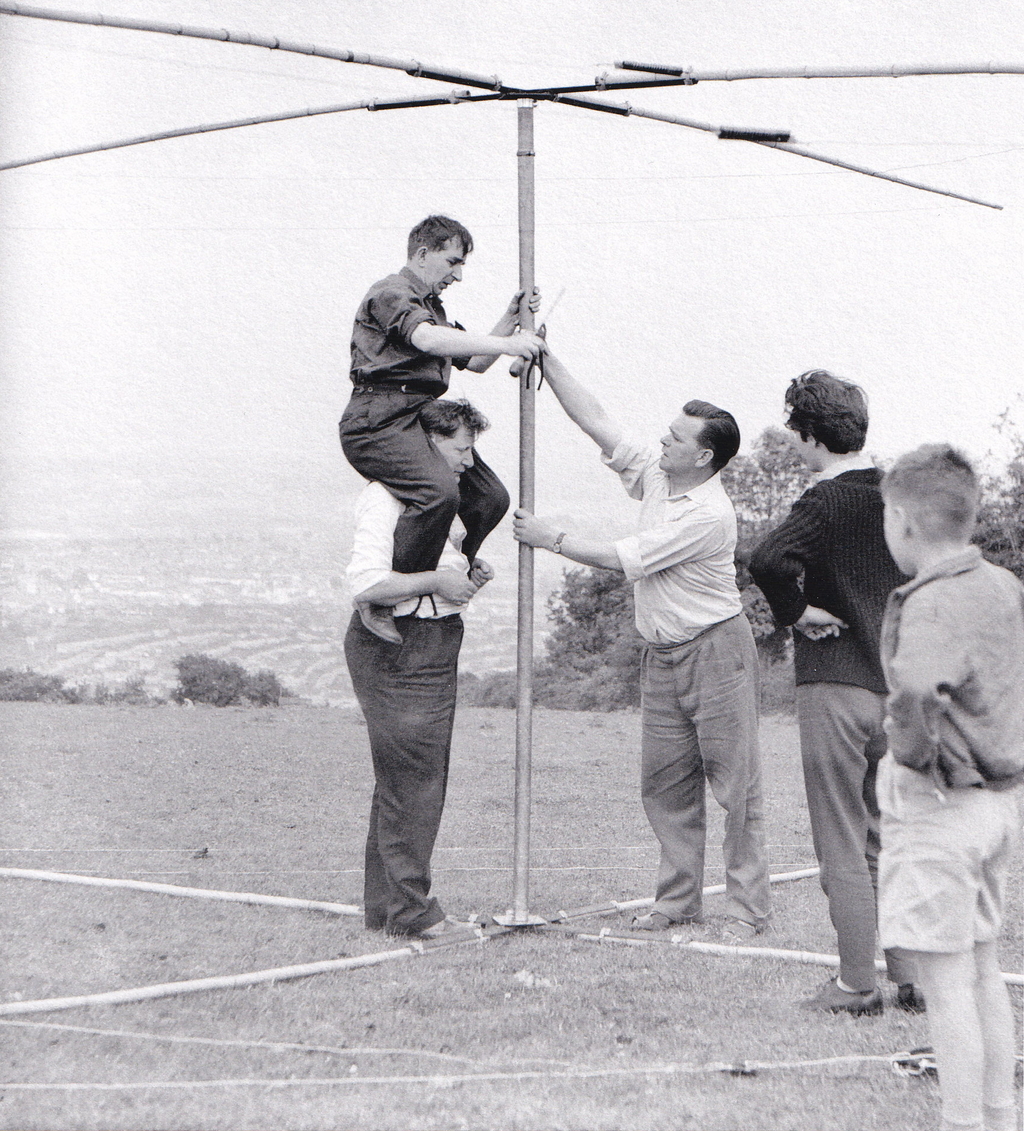
1947
The first since the war, consisted of two stations. Station “A” was at Toghill House Farm and operated 160 and 80 metres, Station “B” was at Hawkesbury Upton and operated 40 and 20 metres.
1948
Permission was sought from HQ to use a site at Dundry for both stations. Separate teams were organised to manage the operating, tents and maintenance and aerials. A site behind Dundry Church in Home Field, Hill Farm, Dundry was used. An annual payment of 100 cigarettes to the farmer, Mr. J. Cave, became traditional. At left is an aerial view of what I believe to be the site used, now occupied by a small housing development. Money was raised to purchase two of the 40 ft. masts used at 3gns each.
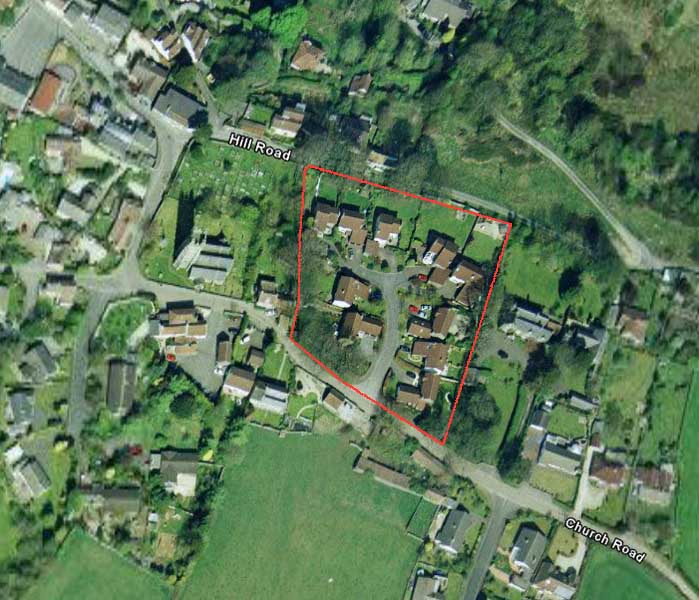
1949
An entry was made in 1949. G2IK and G6GN were involved with help from G6YA. The minutes are sparse and no mention of sites or callsigns was made. The results in the “Bull” give the calls shown below for this year.
1950
A subscription of £9/10/- was offered by members to defray costs. A ZL station reported G6RB/P the strongest G station in his area. Other claimed scores reported included Cranwell 900, Croydon 721, Lincoln 600 and others. A deficit of £3/10/- was recorded. Cheltenham won this year with Cambridge runners up. Congratulations were sent to Cheltenham.
1951
Although we beat the previous year’s winners, Cheltenham, 53 points were deducted from our claimed score for errors in recording times and signal reports received in 1951.
1952
The NFD entry was from Hill Farm, Dundry. Equipment used included an HRO receiver for the “A” station and an AR88 for the “B”. Eight 40ft. masts were erected. Bristol were winners for the first time since the war.
After last year’s success, efforts were redoubled with 12 masts being used to support 3 aerials per station, for the 1953 entry. The “A” station again used an HRO but the “B” used a Hammarlund ‘Super-Pro’ provided by G3CHW. A spare HRO was also provided in case of trouble. Bristol won again.

1954
1954 there was a difficulty caused by Bristol having a vacancy for TR, under whose direction all entries had to be made. HQ was consulted. They were adamant and G2FYT was nominated for the post. The result was a third consecutive victory for the group. In November a meeting resolved to present the Bristol Trophy to HQ to be awarded to the highest scoring single station entry in NFD, to mark the repeated success of the Bristol entries.

Middle row sitting: G3CHW, G3JMP, Mr Gibbs, G6GN, G3CTN, BRS12716.
No identification for any of the youngsters sitting – probably G6GN’s grandsons!
1955
The 1955 minutes give details of the aerials as follows :
- “A” station – 160 + 40 dipoles;
- “B” station – 80 and 20 N/S dipoles, 20 vertical dipole.
Two petrol electric generators were used again and paraffin stoves provided for heating in the operating tents. There was some discussion of transport as few members had vehicles capable of transporting all the gear to the usual Dundry site. It was agreed that all the gear would be transported on the Thursday before the contest, and presumably left unattended. Those were different days! Congratulations were sent to the NFD winners and the first winners of the Bristol Trophy.
1956
1956, the same site at Dundry was used again. An additional 40 metre dipole was used at the “A” station. The Bristol group won yet again.
1965
A few Bristol amateurs who later became part of the Bristol Contest Group in this 1965 Short Wave Magazine image.
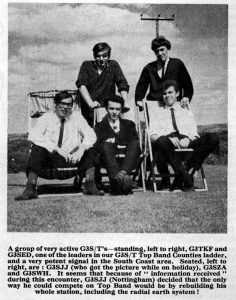
NFD Results
| Year | Callsigns | Committee | Station Scores | Place |
|---|---|---|---|---|
| 1947 | A” G2UH/P, “B” G6GN/P | G2IK, G5KT, G6GN, G8TC | 378 | ? |
| 1948 | A” G5YK/P, “B” G6YA/P | G6YA, G5YK, G8CC | 276 + 385 = 661 | 19th |
| 1949 | A” G6RB/P, “B” G3GN/P | No details minuted for this year | 324 + 362 = 686 | 19th |
| 1950 | A” G6RB/P, “B” G6GN/P ** | G3CHW, G6GN, G3RQ, G6RB, G3CTN, BRS-12716 | 394 + 331 = 725 | 19th |
| 1951 | A” G3YT/P, “B” G6GN/P | G3CHW, G6GN, G3RQ, G2FYT, G5YK, BRS-18798, BRS-12716 | 545 + 301 = 846 | 6th |
| 1952 | A” G2IK/P, “B” G6GN/P | G3CHW, G6GN, G6RB, G2FYT, G3GZA, G2IK, BRS-18798, BRS-12716 | 625 + 498 = 1123 | 1st |
| 1953 | A” G6GU/P, “B” G6GN/P | G3CHW, G6GU, G3HSD, G6GN, G2IK, G3RQ, G3CHW, G2FYT, BRS-18798, BRS-12716 | 567 +487 = 1054 | 1st |
| 1954 | A” G2IK/P, “B” G6GN/P | G2FYT – “A”, G3IFV – “B”, G3CTN, G3RQ, G6GN, G2IK, BRS-12716 | 1091 | 1st. |
| 1955 | A” G2IK/P, “B” G3RQ/P | G3CTN, G3RQ, G2FYT, G2IK, G3CHW, G6GN, BRS-12716 | 406 + 400 = 806 | 18th |
| 1956 | A” G2IK/P, “B” G3RQ/P | G2FYT, G3CTN, G3RQ, G6GN, G3CHW, G2HDR, G2IK, BRS-12716 | 540 + 646 = 1186 | 1st |
| 1957 | A” G2IK/P, “B” G6GN/P | I have no minutes after April 1956. | 637 + 756 = 1393 | 2nd |
| 1958 | A” G2IK/P, “B” G6GN/P | 675 + 504 = 1179 | 8th | |
| 1959 – 1965 | Apparently no entries were made | |||
| 1966 | A” G6RQ/P, “B” G6GN/P | 575 + 768 = 1495 | 18th | |
| 1967 | A” G6GN/P, “B” G4UZ/P | 675 +820 = 1495 | 10th | |
| 1968 | G4UZ/P single station | 680 | 37th. | |
| 1969 | A” G2ATU/P, “B” G4UZ/P | 635 + 1055 = 1690 | 10th |
Thanks to Geoff. G4FKA for searching old “Bulletins” for the results.
** Geoff has the “B” station as ‘6GN, the minutes give ‘3RQ in 1950, the minutes are probably wrong, or the call was changed at a late stage and not minuted.
More recent results can be found on the Bristol Contest Groups results page.

